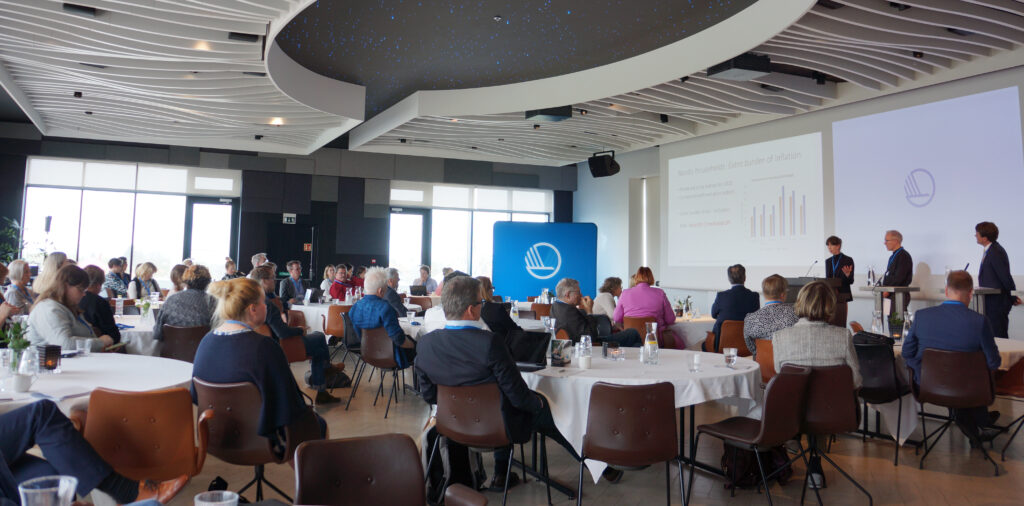Living standards in the wake of inflation: How the Nordic welfare state responds
Velferdspolitikk
27 sep 2023
In 2022, Europe was battered by crises. As the recovery from the pandemic and the full-scale Ukraine war triggered surging energy costs and escalating inflation, the question arises: How significantly were living standards in the Nordic countries impacted by this inflation? Additionally, how did the Nordic welfare states tackle this threat?
– Inflation is something everybody is talking about. Nobody can escape it, declares Hjördís Harðardóttir of Statistics Iceland.
At the Nordic Welfare Forum 2023 in Reykjavik, she and Michael Feldballe, Senior Advisor at the Nordic Social Statistical Committee (NOSOSCO), unveiled new data. Their research explores how significantly 2022’s inflation has strained Nordic households’ living standards, presenting their findings under the heading «The cost of living in a crisis».
– The standard of living is measured through two consumer price indexes, one real and one hypothetical, explains Michael Feldballe.
The hypothetical consumer price index assumes that inflation had followed earlier trends and ignores the recent sharp increase. This imagined index is compared to the actual consumer price index, showing how much the sudden inflation has additionally burdened Nordic households.
The analysis uses various household types, pertinent to the Nordic countries. It also leverages a model based on the average wage in these countries, measuring household income as a percentage of this wage.
– We then factor in elements of social policy like child benefits, calculate taxes and social contributions, including unemployment funds, and include basic data such as rental costs, says Feldballe.
– Through this research, we can directly compare how inflation affected similar households in various Nordic countries.

Remarkably similar impact
– In all Nordic countries, the additional impact of inflation was fairly uniform, with perhaps the exception of Norway, where the effects were slightly less pronounced, explains Hjördís Harðardóttir from Statistics Iceland.
For a single-parent household with one child, the reduction in consumption value due to the excess inflation ranges from 90 to 120 euros per month in Finland, Sweden, Denmark, Iceland and the Faroe Islands. Norway sees approximately half that amount. For a two-parent household with two children, the reduction is between 140 and 180 euros per month, again with Norway experiencing roughly half of this impact.
– Inflation’s effects were mostly uniform across the Nordics, but differences did emerge in the cost of household necessities, says Michael Feldballe.
Electricity price hikes were widespread, but Danish households felt the sting most. Food costs rose similarly across all countries. Rent largely remained stable, with the Faroe Islands as the exception where higher rents added to household burdens.
– A single-parent household with one child experienced the highest cost burden in Denmark. Conversely, for households comprising a couple with two children, the impact of the crisis was most pronounced in Sweden, Feldballe states.
Focusing on families with children
All Nordic countries have implemented policy initiatives to address the impact of inflation. The study focuses on the policy measures implemented between June 2022 and May 2023.
These initiatives specifically target a range of groups, such as low-income households, students, pensioners, and individuals with disabilities. Moreover, some countries have implemented measures to alleviate the burden of utility costs. Notably, one group stands out as the focus of initiatives across all Nordic countries: families with children.
– Child allowances played a significant role during this period in all countries. Each Nordic country implemented at least one special payment, and some introduced ongoing measures that benefited families with children.
Michael Feldballe from NOSOSCO suggests that this focus on families with children reflects the design of the Nordic welfare state.
– There is a particular emphasis on supporting families with children, whether they’re single-parent or two-parent households.
Text: Sebastian Dahlström
Relaterte nyheter
Funksjonshinder
7 mai 2024
Webinar: Knowledge sharing and networking in the social sector across the Nordic countries
Velferdspolitikk
7 sep 2023
